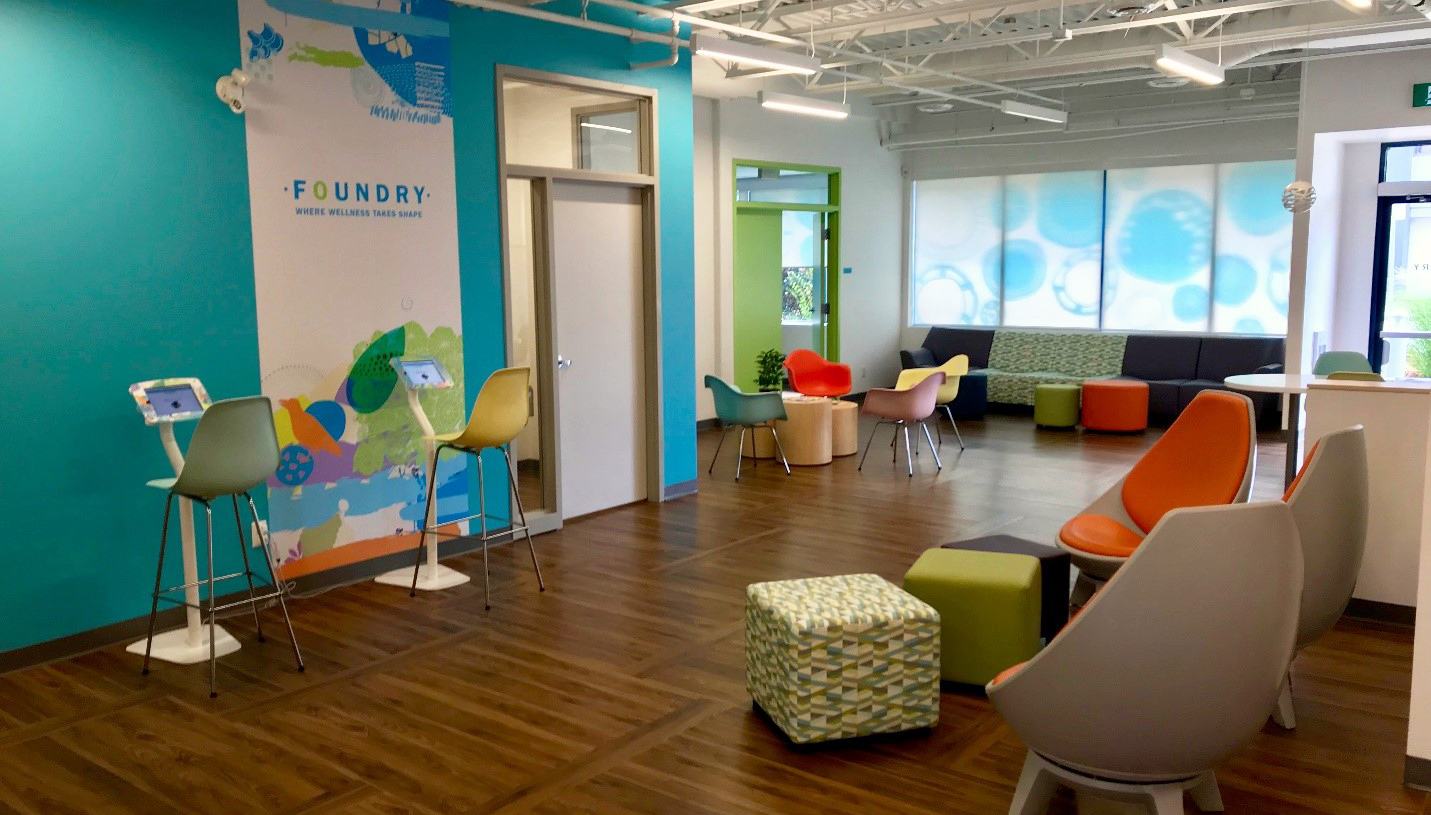On August 12th, the United Nations marks International Youth Day, recognizing young people’s contributions to their communities and the world. At CHÉOS, a team of Scientists focus on empowering youth in Vancouver and throughout B.C. by reforming the province’s health and social services for young people.
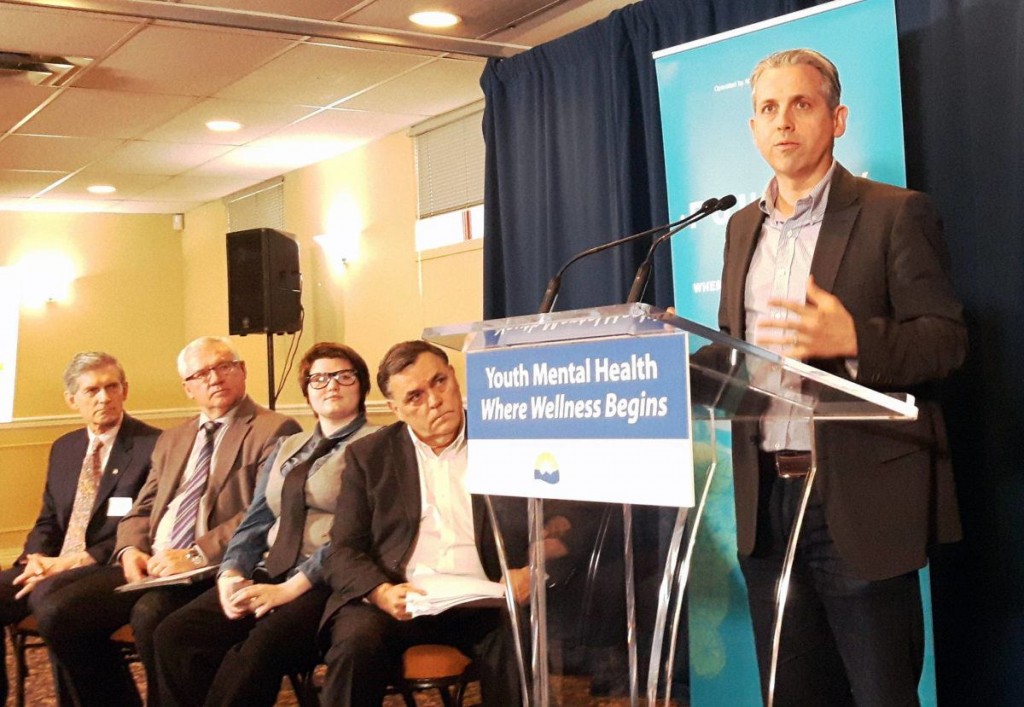
CHÉOS Scientist Dr. Steve Mathias’ vision of mental health care for youth is spreading across the province.
Foundry—a network of centres integrating mental health care and resources with a variety of youth services—is opening in five locations throughout the province, soon to be eleven.
At a Foundry centre, youth aged 12-24 can find not only counsellors and psychiatrists, but a breadth of resources to help them navigate life: Employment services, advice for managing their finances and finding safe housing, peer support, occupational therapy, and more.
Transforming care
Dr. Mathias, a child and adolescent psychiatrist at St. Paul’s Hospital, recognized the need to combine services when he was working with youth staying at Covenant House, a shelter for street-involved youth, between 2007 and 2011. Many of the young people Dr. Mathias encountered had mental health and substance use issues, but also needed medical care, safe housing, income support, and employment assistance.
“From that work, we saw a need to provide a lot of the services that youth needed in one place, and to build that model up so the partners working there weren’t only co-located, but were talking to each other and working together,” said Dr. Mathias, Foundry’s Executive Director.
Mental health and substance use disorders often first present between the ages of 12 and 24, but only 25% of Canadian youth with those issues access care and services.
According to Dr. Mathias, youth tend to seek help from family and friends—people who aren’t trained to offer it, and are therefore at risk of suffering vicarious trauma, getting frustrated and burnt out, or developing mental health and substance use problems themselves if they lack support. Additionally, youth in need may go to walk-in clinics or emergency rooms, where the care they receive can be isolating.
Thus, in 2014, the Ministry of Health joined the Inner City Youth program (ICY) at St. Paul’s Hospital and its partners to build the Granville Youth Health Centre, which features integrated, accessible, and youth friendly care in the community rather than the hospital ward.
Treating the whole person
The Granville Youth Health Centre in Vancouver was the prototype and inspiration for the network of Foundry centres popping up throughout B.C.
Dr. Skye Barbic, an occupational therapist and CHÉOS Scientist, joined the ICY team in 2014, a few months prior to the opening of the Granville Youth Health Centre.
“I remember going for a walk with Steve to this building that was pretty ugly,” Dr. Barbic recalled. “He had a big vision about what it was going to turn into.”
Dr. Barbic’s initial role was supporting the rehabilitation program, which was to reach far beyond recovery from mental illness.
Interestingly, prior research by Dr. Barbic found that mental health experts did not agree on what the best definition for “mental health” is because, beyond the biological elements, it is dependent on various social, moral, and epistemological factors. The study raised the question of how to best measure a patient’s recovery if the definition of mental health itself is unclear.
At Foundry and the ICY program, Dr. Barbic takes the “mental” out of the equation and asks youth to decide what health encompasses for them individually.
“If a youth says, ‘My health involves spending time with friends, having a job, going back to school, building routine in my life, feeling like I’m giving back to the community,’ these are all actual areas that they need help in,” she said. “We try to ensure that our services are mapped out to and embedded in what their health continuum looks like.”
In addition to leading Foundry on the executive team, Dr. Mathias is a psychiatrist at the Granville Youth Health Centre.
“Working at a Foundry centre is awesome. It’s an environment that isn’t stigmatizing, one that’s welcoming, and I think in many ways redefines what people imagine help looks and feels like,” said Dr. Mathias. “When you work in an environment like that, you feel as though there are just so many walls and barriers that have been broken down before you even meet with a young person [seeking help].”
Being part of an interdisciplinary team is especially valuable to Dr. Mathias.
“As a professional, you can often feel stuck, like you’re not able to find a solution or help a person make progress,” he explained. “To be able to call upon another professional of another discipline, or even a different service, and then seeing that person become unstuck is really cool; that’s the best part of working there.”
-
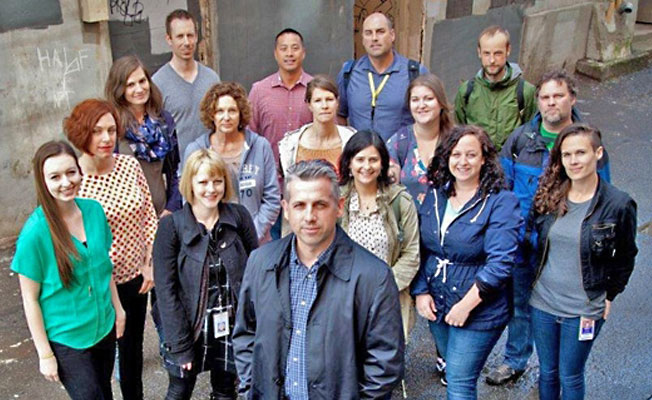
The Inner City Youth team provides services ranging from mental health counselling to help with finding employment.
Research and evaluation
Foundry and ICY are as much about offering services as they are about asking questions.
Research and evaluation were built into the ICY program and Foundry from the beginning, with CHÉOS placed in charge of planning different research avenues, collecting data to inform clinical practice and policy, and evaluating the programs in real time. CHÉOS Scientist Dr. Amy Salmon is Foundry’s developmental evaluator, helping their programs to adapt as the team learns from experience.
Dr. Chris Richardson, the research lead at the ICY program and a CHÉOS Scientist, says the research component is instrumental to driving innovation—both in the implementation of new services and in bringing fresh perspectives on research.
For example, the Naloxone and the Inner City Youth Experience (NICYE) Study, carried out by ICY staff and the B.C. Centre for Disease Control, analyzed the experiences of Granville Youth Health Centre youth who participated in training on how to administer naloxone, an opioid overdose reversal medication.
Prior research and evaluation of B.C.’s Take Home Naloxone program had centred on quantifying the number of kits distributed and overdoses reversed, whereas the NICYE study sought to measure the personal impact of naloxone training on youth—a perspective that hadn’t been explored.
An analysis of the common themes in semi-structured interviews with participants showed that the naloxone training improved the youths’ self-esteem, gave them a sense of agency, improved the participants’ relationships with the ICY staff, and fostered engagement. The research team concluded that naloxone training could serve as a valuable tool for reaching homeless or precariously housed youth, who are often hard to engage.
“Beyond reducing overdoses, naloxone training is about empowering youth and hearing their sense of how we can improve the system,” said Dr. Richardson. “It’s also about understanding what it changed in them when they were treated and trained as part of the solution, not the problem.”
As Foundry grew from the Granville pilot, Dr. Barbic’s role expanded to support the development of a meaningful evaluation plan.
She works with youth and their families, through focus groups and surveys, not only to identify their needs but to test ways to capture these needs efficiently and precisely.
For Dr. Barbic, this research is about accountability and moving from paper into practice.
“Traditionally, they say it takes 17 years for the best evidence to get into practice,” said Dr. Barbic. “Foundry is exciting because it can happen overnight—it’s such a malleable and open environment, where excellence is the goal.”
“We were talking about how to measure anxiety in young people and we were able to tailor our strategy quickly because we had real time data coming in daily to guide our decision making,” she explained. “Within a week, we found out that one approach wasn’t working and now we’re using a different approach in testing anxiety.”
Dr. Richardson credits the environment of the Granville Youth Health Centre, now being replicated at Foundry centres, for allowing it to serve as a “Living Lab” for novel research avenues and innovative practices.
“It’s a real-world population with kids that are traditionally hard to recruit into studies, yet we’ve created an environment where youth feel proud of the program and want to contribute to it by participating in research, and feel valued as partners in research,” he said.
Dr. Barbic also noted the opportunity of the Foundry network to contribute new perspectives to the research, health care, and political systems that are traditionally structured to address issues in silos.
“The complexity of being a young person in any society is really quite multifaceted and it takes a special type of integrated research program to look at that,” she said.
-
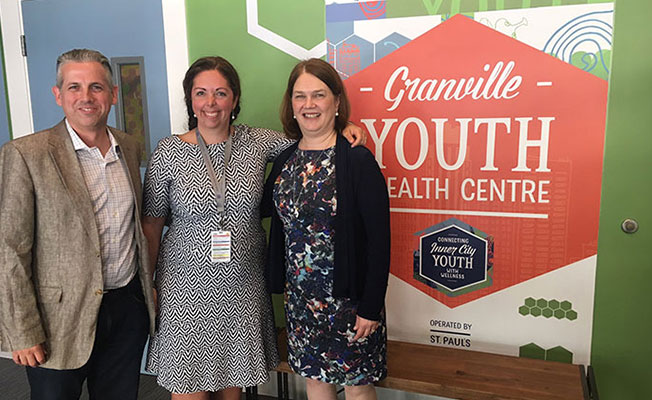
Federal Health Minister Dr. Jane Philpott (right) visited the Granville Youth Heath Centre and met with Drs. Mathias and Barbic.
Opportunities for knowledge translation
Dr. Mathias said many lessons have been learned from the Granville Youth Health Centre that will inform the Foundry network, from the design of the physical space and the importance of forming partnerships with other youth-centred organizations, to the services youth need, such as one-time, walk-in counselling sessions.
But their research can inform multiple sectors, including public policy, other youth services, and individual counsellors.
Dr. Richardson is particularly interested in working with clinical psychologists at St. Paul’s Hospital to study how neurocognitive deficits in youth, which are often mistakenly identified simply as a “bad attitude,” can influence housing stability, substance use, and the youth’s ability to engage with services or employment. He hopes such research can help counsellors and social workers to recognize the subtleties in homeless youths’ behaviour, and to adapt their care strategies accordingly to develop meaningful relationships that ultimately lead to better outcomes.
Dr. Richardson has also noticed that youth who have been in foster care are over-represented in the Granville Centre and often have mental health conditions that could have been identified and addressed earlier.
“The B.C. Ministry of Children and Family Development needs to become much more proactive in identifying kids with underlying mental health and learning difficulties, and supporting them so they don’t find themselves at 19, entrenched in street life, with issues that limit their ability to thrive,” said Dr. Richardson.
A PhD student of his, Javiera Pumarino, is conducting research to identify opportunities to facilitate the early detection and treatment of emerging forms of mental illness among youth in the foster care system. Dr. Richardson noted that the Foundry network has the potential to play a critical role in providing community-based support for youth as they plan their exit from the foster care system and transition to independent living as young adults.
Looking ahead
As Foundry takes off, Dr. Mathias hopes to see policy developments that will continue to transform care for youth in B.C.
These include strategies with a specific focus on the transition-age youth population, which provide adequate funding for prevention and early intervention, support for mental health and general health practices that take into account education and employment, and public health messaging that addresses safe substance use in an honest way.
-
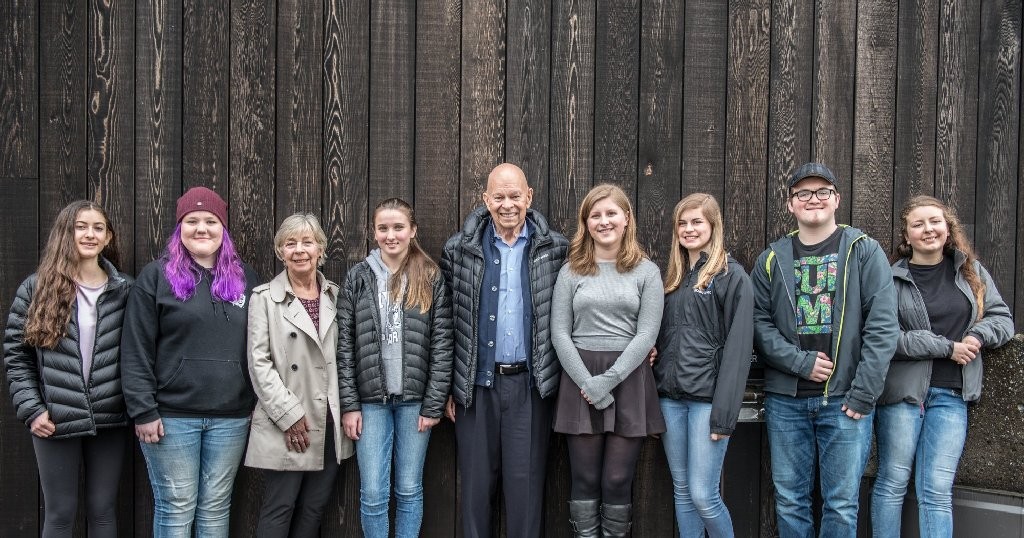
Young people in Vancouver meet with philanthropists Diane and Bob Conconi, who contributed to fundraising efforts for Foundry.
“We need to make sure that as a community, we can feel confident that we’re doing everything we can to make sure young people are successful, and not assuming that we can just leave it to them to figure it out,” Dr. Mathias said.
Fortunately for the CHÉOS Scientists, there is no shortage of youth willing to contribute to research.
“People might think youth don’t care and they’re not engaged, but this is not the story at all,” Dr. Barbic said.
“We can’t keep up with the number of youth who want to participate in our focus groups and research projects right now—there are so many engaged youth who want to contribute to advancing the health of our community. They feel like their voice is really, really important.”
